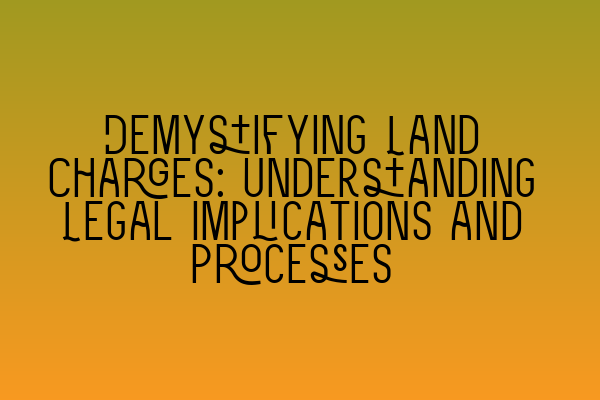Demystifying Land Charges: Understanding Legal Implications and Processes
When it comes to property law and land law, one area that can often cause confusion is the concept of land charges. Understanding the legal implications and processes involved in land charges is essential for any property owner or individual involved in property transactions. In this article, we will demystify land charges, providing you with a clear understanding of their significance and how they function within the legal framework.
What are Land Charges?
Land charges are legal restrictions and encumbrances that affect land or property. They are typically registered with the Land Charges Department, an office maintained by the Land Registry. The purpose of registering land charges is to provide public notice of any restrictions, rights, or interests that may impact a property.
Land charges cannot be easily discovered by physical inspection of the property, which is why registration is crucial. They often relate to financial matters, such as mortgages, loans, or other debts, but can also include restrictions on land use, rights of way, and other legal interests.
Types of Land Charges
There are several types of land charges that can affect a property. Some common examples include:
- Mortgages: A mortgage is a type of land charge that secures a loan against the property. It provides the lender with a legal interest in the property until the loan is repaid.
- Restrictive Covenants: These are agreements that restrict the use or development of the land. For example, a restrictive covenant may prohibit the construction of additional buildings on the property.
- Notices: Notices can be registered to protect the rights and interests of individuals or organizations. For instance, a notice may be filed to protect a right of way across the property.
- Bankruptcy Orders: If a property owner becomes bankrupt, a bankruptcy order may be registered against their property as a land charge.
The Importance of Land Charge Searches
Before purchasing a property, it is crucial to conduct land charge searches to identify and understand any existing charges or restrictions. These searches provide valuable information about the property’s legal status, potential liabilities, and any third-party interests that may impact the property’s value or use.
Land charge searches are typically carried out by solicitors or conveyancers as part of the property purchase process. They involve searching the Land Charges Register and other relevant databases to gather information about any registered land charges affecting the property.
By conducting thorough land charge searches, potential buyers can make informed decisions, negotiate terms, and address any issues or concerns before completing the purchase.
How to Register Land Charges
If you wish to register a land charge, you must submit an application to the Land Charges Department. The application must include the necessary information and supporting documents, such as the details of the charge, the property affected, and any applicable fees.
Upon successful registration, the land charge will become part of the public record, providing notice to anyone with an interest in the property.
Conclusion
Understanding land charges and their legal implications is vital for property owners, buyers, and professionals involved in property transactions. By familiarizing yourself with the different types of land charges, conducting thorough land charge searches, and adhering to the registration process, you can ensure that you are fully aware of any restrictions, rights, or interests that may affect a property.
For more information on related topics, check out our articles on:
- Understanding Contractual Capacity: Rights and Limitations
- Interactive SQE Mock Tests for Contract Law: Test Your Knowledge
- Join Our SQE Contract Law Webinars: Expert Insights and Guidance
- Contract Law Reforms: An Analysis of Recent Changes
- Parties in a Contract: Rights and Responsibilities
At SQE Property Law & Land Law, our experienced solicitors specialize in property law and are here to assist you with any queries or legal issues you may have. Contact us today for expert guidance and personalized advice.
